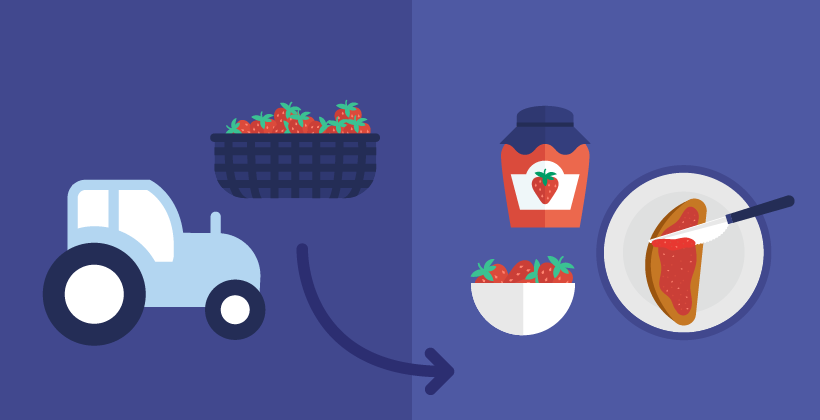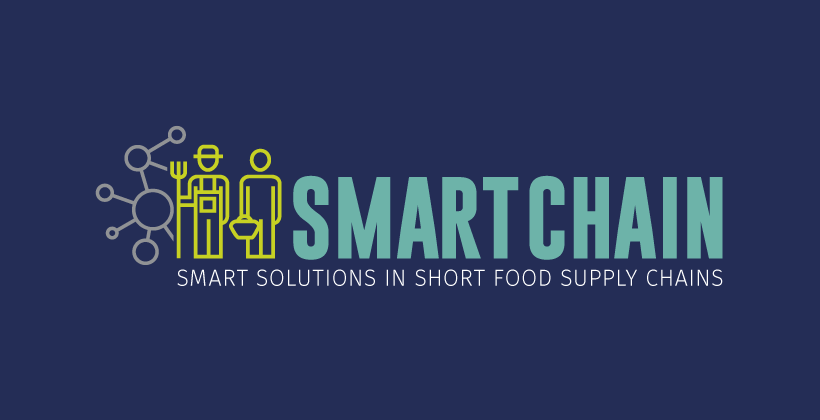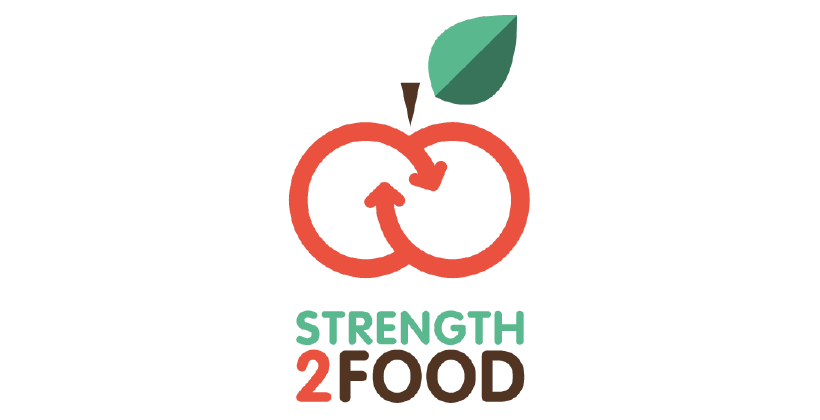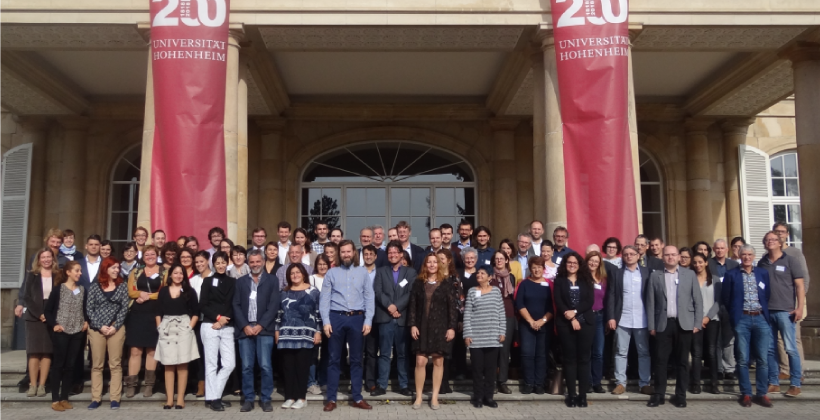The benefits and sustainability of short food supply chains
Last Updated : 26 May 2021More direct models of food distribution and consumption known as Short Food Supply Chains (SFSCs) are attracting interest for their potential to bring about social, economic and environmental benefits in comparison to more conventional practices. SFSCs may indeed offer mutual benefits to both farmers and consumers, help deliver a more sustainable food system while addressing some of the most pressing environmental challenges and social issues. They might act as model to increase transparency, trust, equity and growth throughout the agri-food chain, and contribute to an improved competitiveness and overall sustainability of the European agri-food system.
The following infographic has been produced jointly by the SMARTCHAIN and Strength2Food projects to provide an overview of how and in which context SFSCs can be beneficial. Below you will find more insights on the projects’ research underpinning these benefits.1,2
Download the printable version here.
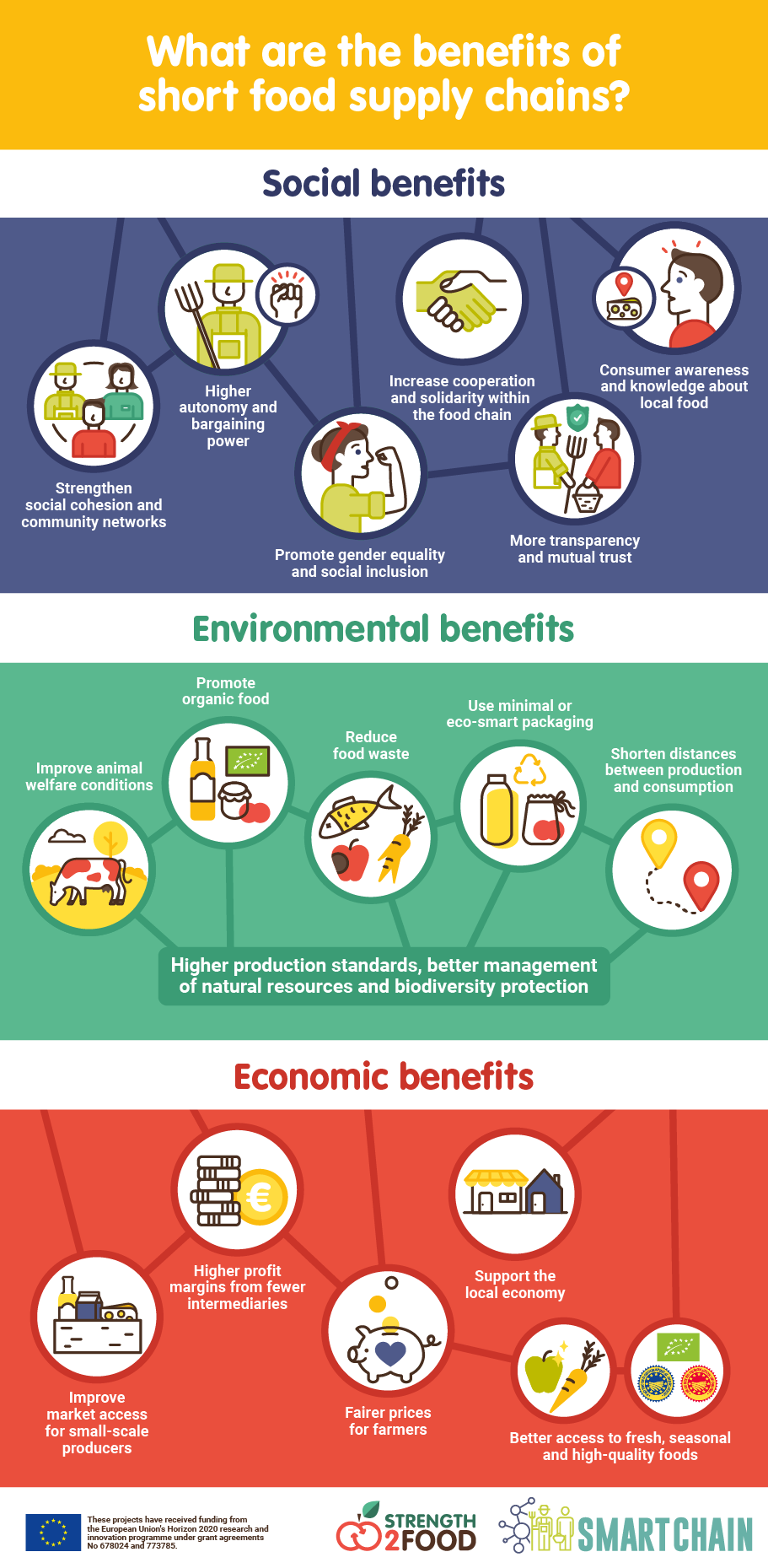
Assessing the sustainability and impact of short food supply chains – Strength2Food
Strength2Food project produced a report looking at the economic, social and environmental impacts of SFSCs and their sustainability.3,4 This research was based on observations from 208 food businesses, involved in 486 market chains, from 6 European countries (France, Hungary, Italy, Norway, Poland and the UK) as well as Vietnam.
The study suggests that SFSCs allow producers to benefit financially by capturing a large proportion of margin otherwise absorbed by different intermediaries in longer chains (e.g. wholesalers, distributors or retailers). Producers also perceive greater bargaining power when selling via SFSCs. Important associated benefits include job creation and promotion of gender balance, due to greater employment opportunities for women in logistics and trading activities compared to longer chains. Although the labour resources needed for sales processes differ across chains, overall, SFSCs appear more labour intensive when compared to longer chains for a variety of reasons. For instance, in addition to the time spent by the producer on transportation and selling via farmers’ markets or similar activities, packaging may be at the expense of the producer rather than the retailer, requiring considerably more time for preparation for bulk delivery. Interestingly, the study also found that actors involved in SFSCs are also typically simultaneously involved in conventional supply chains. This helps them offset the risks and shortcomings of the short-chains (such as limited demand) while continuing to enjoy the benefits associated with direct sale.
Regarding the environmental impacts of SFSCs, the evidence appears less clear cut. In fact, SFSCs can be associated with higher food miles and larger carbon footprints. This is because participants of these chains, especially consumers, can accumulate a large number of journeys transporting relatively small quantities of food at a time. However, the carbon footprints of different types of SFSCs is not uniform and can differ largely across regions and market scales.
Environmental and socio-economic impact assessment of SFSCs - SMARTCHAIN
Through a combination of life cycle assessments and a study on the perceptions of food producers about the benefits of short food supply chains, the SMARTCHAIN project evaluated SFSC innovations from six selected and representative European case studies from an environmental, social and economic perspective in comparison to conventional food chain practices.
Overall, SFSCs seem to allow a higher share of added value to be retained locally, with positive effects on maintaining local employment, particularly in rural areas. Beyond the socioeconomic reasons, social integration and empowerment have a great importance when food producers choose SFSCs, which show better social impacts, with less gender discrimination, less corruption, fair competition and appropriate working time. Direct connection with consumers, the control of the product along the value chain and the integration in the local community were mentioned as the most important advantages to be involved in SFSCs. In particular, the relationships within professionals along the value chain and with consumers is more convivial and there is more solidarity and cooperation. Lastly, the impact of the COVID-19 crisis on SFSC businesses varied a lot according to the country and the type of products, with animal-based food producers reporting a significantly more positive impact than others.
The main environmental impacts of agricultural products across all different kinds of supply chains are related to primary production, especially the application of fertilizers and plant protection products and land use. Because of the large variety of types of SFSCs, no general conclusions regarding environmental impacts of SFSCs logistics could be drawn. Consumer transport can be very inefficient since core parameters are the distance driven by car per kg of produce, the range of produce and the buying habits (bulk or small portions). Packaging instead, although important along the supply chain, is not a major contributor. This depends on the raw material (glass is usually more impactful than plastics), and on whether and how it is disposed of or re-used. Depending on the case, packaging actually shows positive environmental effects like extending shelf-life and reducing food waste.
References
- Belletti G. & Marescotti A. (2020) Short Food Supply Chains for promoting Local Food on Local Markets. United Nations Industrial Development Organization (UNIDO)
- Vittersø G. et al (2021) Strategic Guide on Short Food Supply Chains. Strength2Food website.
- Malak-Rawlikowska A et al. (2019). Measuring the Economic, Environmental and Social Sustainability of Short Food Supply Chains. Sustainability 2019, 11(15), 4004.
- Vittersø G. et al. (2019) Short Food Supply Chains and their Contributions to Sustainability: Participants' Views and Perceptions from 12 European Cases. Sustainability 2019, 11(17), 4800.
